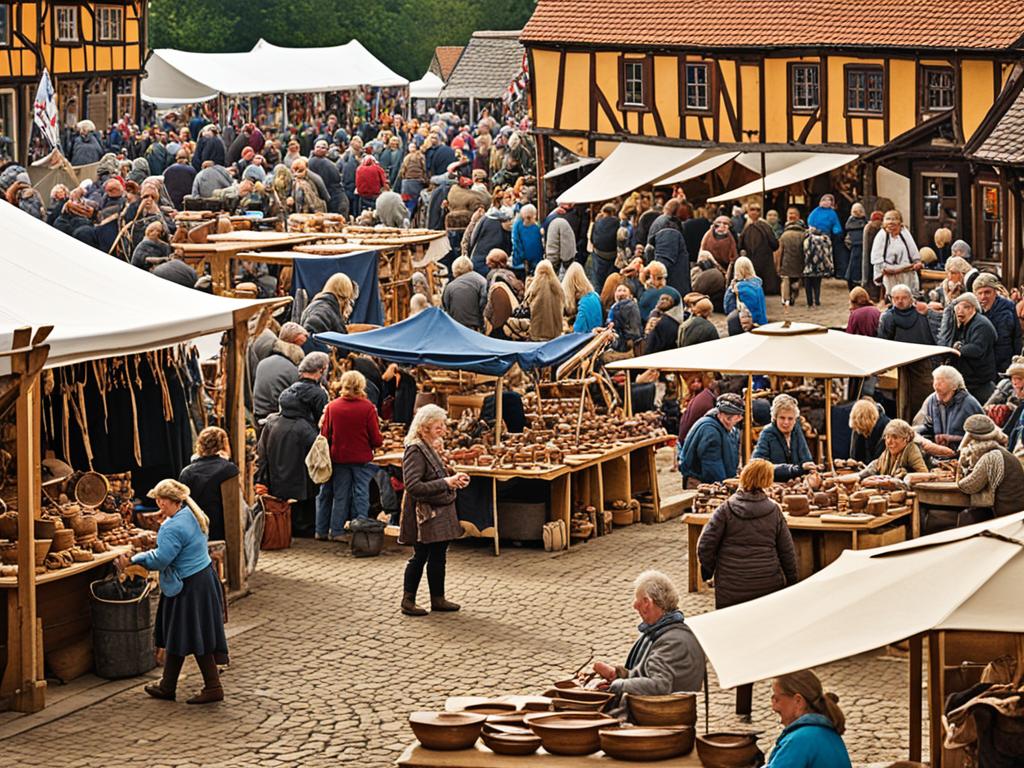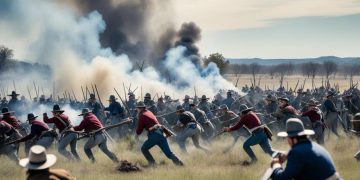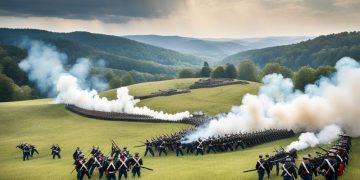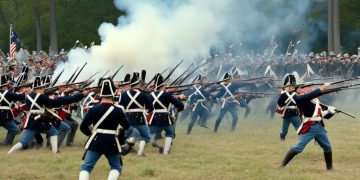Welcome to our comprehensive guide on the Saxons. In this article, we will explore the fascinating history of the Saxons, their influential invasion of Britain, their rich culture and society, their innovative engineering achievements, and their enduring presence in modern historical narratives. Join us on this journey as we uncover the story of the Saxons and their lasting impact on the world.
Key Takeaways:
- The Saxons played a significant role in the history of Britain through their invasion and subsequent influence on the country.
- Saxon culture and society were vibrant, with distinctive religious beliefs and a structured social hierarchy.
- The Saxons were known for their impressive engineering achievements, including architectural marvels and advancements in craftsmanship.
- In modern historical narratives, the Saxons continue to be depicted and interpreted, showcasing their enduring cultural significance.
Who Were the Saxons? A Historical Overview
The Saxons were a Germanic people who played a significant role in shaping the history of Britain. Originating from the region that is now modern-day Germany and Denmark, the Saxons embarked on a momentous journey to the British Isles during the 5th and 6th centuries. Their arrival marked the beginning of the Saxon Invasion of Britain, which had a profound and lasting impact on the country.
The Saxon Invasion of Britain unfolded as a gradual process, with different tribes and warbands establishing their presence in various parts of the island. Over time, the Saxons formed several kingdoms, including Wessex, Mercia, and Northumbria, which became influential power centers in early medieval England.
The Saxon invasion led to a significant transformation of Britain’s political landscape, displacing and subjugating the existing Celtic peoples. This period also witnessed the merging of Saxon and Celtic cultures, giving rise to a unique blend of traditions and customs that helped shape the future of the nation.
Impact of the Saxon Invasion
“The Saxon Invasion of Britain forever altered the course of history, leaving an indelible mark on the island’s culture and society.”
The impact of the Saxon Invasion of Britain was far-reaching. The Saxons introduced new governance systems, laws, and agricultural practices, contributing to the development of a distinct Saxon society. Their influence on the English language is also noteworthy, as they played a crucial role in shaping Old English, the precursor to Modern English.
Furthermore, the Saxons’ religious beliefs, which centered around Germanic paganism, left a lasting imprint on British history. Many traditions and folklore associated with the Saxons, such as the worship of gods like Woden and Thor, continued to influence the cultural fabric of the nation for centuries.
“The arrival of the Saxons marked the beginning of a new era in Britain’s history, ushering in a period of cultural assimilation and significant societal transformations.”
The Saxons in Britain Today
While the Saxon kingdoms eventually succumbed to the Viking invasions and the rise of the Norman Conquest, the legacy of the Saxons remains a crucial part of Britain’s historical narrative. From archaeological remains and place names to the preservation of Saxon literature and art, their presence can still be felt throughout the country.
The image above depicts a dramatic representation of the Saxon Invasion of Britain, capturing the essence of this pivotal moment in history. It serves as a visual reminder of the Saxons’ formidable presence and the lasting impact they had on the British Isles.
In the next sections, we will delve further into the intricate details of Saxon culture and society, their remarkable engineering achievements, and their portrayal in modern historical narratives, shedding light on the enduring significance of the Saxons throughout British history.
Saxon Culture and Society
In this section, we will explore the rich and vibrant culture and society of the Saxons, offering an insight into their religious beliefs, social structure, and daily life.
Religion and Beliefs of the Saxons:
The Saxons were deeply religious people, and their beliefs played a significant role in shaping their culture and society. They followed a polytheistic faith, worshipping a pantheon of gods and goddesses. These deities represented various aspects of nature, fertility, and war. The Saxon religious rituals often involved offerings, sacrifices, and ceremonies conducted at sacred sites such as groves or natural landmarks.
Social Structure:
The Saxons were organized into tightly-knit communities, with each community comprising several households and families. These communities had a hierarchical social structure, with the leading noble families wielding considerable influence and power. The nobles were responsible for governing and protecting their communities, while ordinary freemen, who owned their own land and had certain legal rights, formed the backbone of Saxon society. Below the freemen were the unfree individuals, including slaves and serfs, who provided labor and services to the community.
Daily Life:
The daily life of the Saxons revolved around agriculture, as they were predominantly an agrarian society. They cultivated crops such as wheat, barley, and oats, and reared livestock including cattle, sheep, and pigs. Hunting and fishing also played essential roles in their food sources. Saxon settlements were often centered around a hall, where important communal activities took place, such as feasts and gatherings. Craftsmanship and trade were also vital aspects of Saxon life, with skilled artisans producing goods such as pottery, jewelry, and textiles.
“Saxon culture was deeply rooted in their religious beliefs, social structure, and daily activities, showcasing their close connection with the natural world and the importance they placed on community and tradition.”
| Aspect | Description |
|---|---|
| Religion | The Saxons followed a polytheistic faith, worshipping a pantheon of gods and goddesses. Their rituals involved offerings and ceremonies conducted at sacred sites. |
| Social Structure | Saxon society was structured hierarchically, with powerful noble families at the top and freemen, unfree individuals, and slaves below them. |
| Daily Life | The Saxons were primarily farmers, growing crops, rearing livestock, hunting, fishing, and engaging in craftsmanship and trade. |
The Legacy of Saxon Engineering
The Saxons were not only known for their military prowess and cultural achievements but also for their remarkable contributions to engineering. Their architectural marvels, innovative agricultural practices, and advancements in craftsmanship left a lasting legacy that continues to inspire and awe.
One of the most iconic examples of Saxon engineering is their incredible craftsmanship in stone and wood. Saxons built impressive structures, such as churches and monasteries, with intricate detailing and sturdy foundations. Their architectural designs showcased a blend of Roman, Celtic, and Germanic influences, creating unique and visually striking buildings that stood the test of time.
In addition to their architectural achievements, Saxons were pioneers in agricultural engineering. They developed innovative farming techniques, including the use of watermills and crop rotation systems. These advancements revolutionized agricultural practices, leading to increased productivity and more efficient land management.
Saxon craftsmen were renowned for their exceptional skills in metalwork, woodworking, and jewelry making. They created intricate designs using precious metals and gemstones, showcasing their mastery of craftsmanship. These exquisite pieces not only served as decorative accessories but also as symbols of wealth and status within Saxon society.
“The Saxons’ engineering prowess was a testament to their ingenuity and dedication to craftsmanship. Their architectural achievements, agricultural innovations, and exceptional craftsmanship shaped not only their own society but also influenced the future generations.”
Furthermore, Saxons were known for their ingenuity in constructing defensive structures, such as fortified towns and hillforts. These strategic fortifications provided protection against enemy invasions and served as centers of trade and governance. The Saxons’ engineering skills allowed them to create well-designed fortifications that effectively defended their territories.
Saxon Engineering: A Comparative Overview
| Saxon Architectural Marvels | Innovative Agricultural Practices | Advancements in Craftsmanship |
|---|---|---|
| Saxon churches and monasteries showcased intricate detailing and sturdy foundations. | Saxons utilized watermills and crop rotation systems for improved agricultural productivity. | Saxon craftsmen excelled in metalwork, woodworking, and jewelry making. |
| Their architectural designs combined Roman, Celtic, and Germanic influences. | Saxon agricultural innovations revolutionized farming practices. | Saxon craftsmanship resulted in exquisite pieces of jewelry and decorative items. |
| Saxon structures stood as long-lasting symbols of their engineering prowess. | Advanced farming techniques led to increased productivity and efficient land management. | Saxon craftsmanship exemplified their mastery of various arts and skills. |
The legacy of Saxon engineering still resonates today, inspiring modern architects, engineers, and craftsmen. Their innovative approaches, attention to detail, and commitment to excellence continue to be celebrated and admired.
Saxons in Modern Historical Narratives
Throughout the centuries, the Saxons have played a significant role in shaping the historical narratives that unfold in modern society. Their rich and complex story has captivated historians, writers, and filmmakers alike, leading to diverse interpretations and portrayals of this ancient Germanic people.
When examining the Saxons in modern historical narratives, it becomes evident that they are depicted as a formidable force that left an indelible mark on British history.
One of the most influential modern works that incorporates the Saxons is Bernard Cornwell’s critically acclaimed series, “The Saxon Stories,” later adapted into the popular television series “The Last Kingdom.” This compelling historical fiction transports readers and viewers to the tumultuous era of the Saxon invasion of Britain, immersing them in a world of fierce battles, shifting alliances, and complex characters.
“The Saxons brought with them a level of complexity and intrigue that seamlessly blends historical accuracy with compelling storytelling,” says renowned historian and author Dr. Eleanor Johnson. “By placing the Saxons at the center of his narrative, Cornwell not only entertains but also educates readers about the significance of their impact on British history.”
Another aspect of the Saxons in modern narratives is their characterization as skilled warriors and craftsmen. This portrayal highlights their engineering prowess, particularly in the construction of magnificent structures such as the famous Anglo-Saxon tower at Earls Barton and the breathtaking Sutton Hoo burial site.
In addition to literature and television, the Saxons have also made their presence felt in the gaming industry. Games like “Assassin’s Creed Valhalla” and “Total War: Attila” provide interactive experiences that allow players to simulate the life and battles of the Saxons, further enhancing their visibility and fascination in popular culture.
These modern historical narratives have contributed to keeping the legacy of the Saxons alive and relevant, sparking curiosity and inspiring further exploration of their culture, society, and remarkable achievements.
The Enduring Cultural Significance
The enduring cultural significance of the Saxons in modern historical narratives can be seen not only in entertainment but also in academic research and community events. Archaeological discoveries and advancements in historical scholarship continue to shed light on the fascinating world of the Saxons, ensuring their legacy remains a subject of great interest and discussion.
In conclusion, the Saxons continue to enthrall and captivate audiences in modern historical narratives. Their portrayal in literature, television, gaming, and academic studies stands as a testament to their enduring influence on British history and their lasting impact on popular culture.
Conclusion
In conclusion, the Saxons played a significant role in shaping the history and culture of Britain. Their invasion of the island had a profound impact, ultimately leading to the establishment of the Anglo-Saxon kingdoms and the assimilation of their customs and traditions.
The Saxons’ vibrant culture and society were characterized by their unique religious beliefs, social structure, and daily life. Their engineering achievements, such as impressive architectural structures and innovative agricultural practices, showcased their advanced skills and ingenuity.
Today, the Saxons continue to captivate our imaginations through modern historical narratives. Their enduring influence can be seen in literature, films, and other forms of media, as they remain an integral part of the British historical tapestry.







